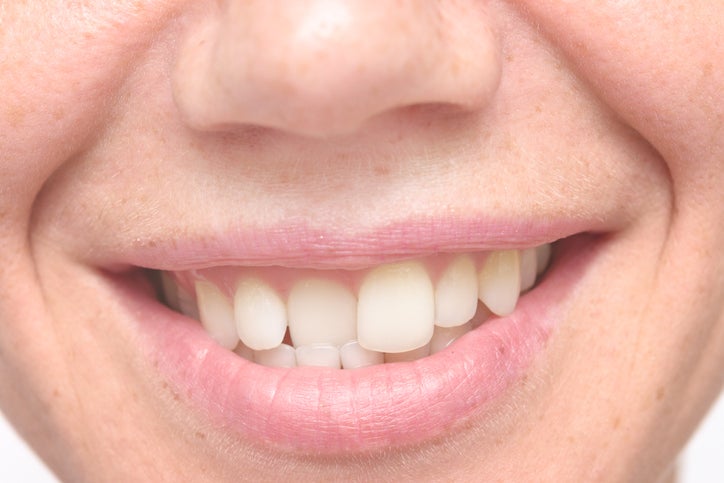-
Why our Teeth Shift or Become Crooked

Have you noticed a shift in your bite? You might think that your teeth are firmly attached, but it’s actually very common for them to shift, becoming crooked or misaligned. What causes teeth to move around in your head? And what should you do about it?
- Sometimes baby teeth become crooked. It doesn’t necessarily mean the permanent teeth will be crooked, but in some situations it does. Baby teeth may just be crooked because they’re too small for the available gum space. If a child sucks a thumb or pacifier for too long, the baby teeth may become crooked, and if there is trauma to the mouth or tooth decay that causes a baby tooth to fall out prematurely, the permanent teeth may grow in crooked. If the baby teeth are crowded, the permanent teeth probably will be too. Genetics and heredity play a role, and poor dental habits and poor nutrition are sometimes the problem.
- Your jaw size may be to blame. Some scientists believe that our teeth often become overcrowded because our jaws have evolved to be smaller than they used to be. Interestingly, the lower jaw grows forward continually, throughout a person’s lifetime. This can cause the lower front teeth to bump into the upper front teeth, which either makes the top teeth spread out or the bottom teeth become crowded. On the other hand, the width of your lower jaw diminishes over the years, which also contributes to crowding of the lower teeth.
- Teeth can lose enamel and change shape. Whether it’s because of an injury or acid erosion, sometimes enamel is lost from your teeth, changing their shape. This can cause them to move out of alignment. Grinding the teeth, a condition called bruxism, can change the shape of the teeth as well.
- As you age, your teeth may shift. Aging causes bones, ligaments, and muscles to grow weaker. What’s more, the constant pressure of moving against each other can wear teeth down, causing them to shift and crowd.
Sometimes, there’s no reason to do anything about teeth that have shifted. Your quirky, crooked smile may just be part of who you are, and there’s nothing wrong with that. There are some factors, though, that would make it a good idea to move your teeth back where they belong. If it’s hard to chew, to speak, or to keep your teeth clean, or your crooked teeth are diminishing your confidence, there are many options available for straightening them.
At Park 56 Dental Group, we provide personalized, quality dental care in a spa-like environment. We offer pediatric, prosthodontics, endodontics, oral surgery, Invisalign®, emergency, and sedation dentistry, all at the highest level of treatment. We serve the Midtown, Central Park, Upper East Side, Park Avenue, and all surrounding Manhattan and New York areas, in a patient-centered practice with hours to fit your schedule. Schedule your complimentary consultation today by contacting us online or calling us at (212) 826-2322.
-
The Importance of Having your Cavities Filled

Even if you brush and floss religiously, doing your best to have pristine teeth and perfect oral health, you’re likely to one day have a cavity. If this happens, don’t delay treatment. It’s important to get any cavities filled as soon as possible, for many reasons.
- Tooth decay, left to its own devices, will spread. If you ignore a cavity, the decay will soon spread to the area around the cavity. Then you’ll not only have a bigger cavity than you originally had, but you may also have additional cavities as well. Getting it filled will solve the problem and keep the damage from spreading.
- Bacteria from a cavity is unlikely to stay in your mouth. An unhealthy tooth won’t just affect nearby teeth: it will spread bacteria as far as it can. Bacteria in your mouth is not ideal, but once it gets into your bloodstream and makes its way to other parts of the body, it can be extremely dangerous.
- Fillings keep your smile intact. If you don’t get a cavity filled in a timely manner, you may end up having to have the tooth removed entirely. Dental implants can solve the problem of missing teeth, but they’re much more expensive than fillings and require a much more complicated process. You’ll have a hole in your smile until you can get the implant, and this can compromise the bone in your jaw.
Those are pretty compelling reasons to get your cavities filled, but did you know there are different types of fillings? Each material used in fillings has its pros and cons, and your dentist will be able to help you determine which is right for you.
- Amalgam fillings have been around for over a century. They’re strong and ideal for cavities in the molars, because they can take the impact of chewing. Made of a combination of several metallic elements, they are sometimes visible when you laugh or smile, but they’re some of the least expensive cavity-filling materials.
- The other most common filling material is composite fillings. Sometimes called composite or filled resins, they’re made of a combination of glass or quartz filler. They can be made to match the color of your tooth, and they’re good in areas involved in moderate chewing.
- Metals, ceramic, and glass ionomer are also used as fillings. Gold and silver are often used, and these metallic fillings can last 10-15 years. Ceramic or porcelain fillings are attractive but expensive, and glass ionomer fillings can release fluoride to protect teeth but are less durable than other fillings.
At Park 56 Dental Group, we provide personalized, quality dental care, offering pediatric, prosthodontics, endodontics, oral surgery, Invisalign®, emergency, and sedation. We serve the Midtown, Central Park, Upper East Side, Park Avenue, and all surrounding Manhattan and New York areas, in a patient-centered practice with hours to fit your schedule. Schedule your complimentary consultation by contacting us online or calling (212) 826-2322.
-
The Relationship Between Sleep Apnea and Your Teeth

If your dentist were to ask you about your sleep, would that surprise you? In fact, dentists are often the earliest diagnosticians of sleep disorders. What is the connection between oral health and sleep disturbances?
According to the National Sleep Foundation, about 18 million Americans have sleep apnea. This condition involves pauses in breathing throughout the night, lasting from a few seconds to minutes, and sometimes occurring 30 or more times each hour. They happen because of airway obstructions caused by a too-large tongue, flaccid throat muscles, or a too-small jaw. But what does this have to do with your teeth?
Often, the first sign of sleep apnea is bruxism, or tooth grinding. When a dentist notices worn tooth surfaces, this is an indication that the patient suffers from bruxism. Grinding the teeth can cause tooth breakage, and sometimes a spike in cavities because of the damage.
Sleep apnea can be dangerous. It diminishes sleep quality because gasping for breath causes people to wake up throughout the night. What’s more, sleep apnea is linked to high blood pressure, heart disease, diabetes, and obesity. It can also contribute to periodontal disease.
You might notice some of the signs of sleep apnea yourself. These include chronic snoring, daytime drowsiness, morning headaches, or waking up with a dry mouth or sore throat. Bruxism can manifest in tired, tight jaw muscles or sensitive teeth. If any of these symptoms seem familiar, talk to your dentist about sleep apnea
If your dentist thinks you have sleep apnea, he or she may recommend a sleep study. Once a diagnosis is confirmed, there are solutions for sleep apnea. You benefit from lifestyle changes like losing weight and quitting smoking, or you might need a custom mouthguard. If your sleep apnea is moderate to severe, you might need a CPAP, or continuous positive airway pressure device. This is a mask that fits over your nose when you’re sleeping and uses air pressure to keep your airway passages open. You might also benefit from a custom Often, when the apnea is resolved, the bruxism stops entirely.
At Park 56 Dental Group, we want to deliver the most effective sleep disorder treatment in NYC. Our founding senior partner, Dr. Philip S. Abramsky, specializes in sleep disorders, and he will work to determine which treatment is right for you. Through a series of examination, he’ll diagnose the cause of your sleep disorder, in order to recommend the proper treatment. It’s all part of our commitment to offering personalized, quality dental care in a spa-like environment. We offer pediatric, prosthodontics, endodontics, oral surgery, Invisalign®, emergency, and sedation dentistry, all at the highest level of treatment. We serve the Midtown, Central Park, Upper East Side, Park Avenue, and all surrounding Manhattan and New York areas, with a patient-centered practice that has hours to fit your schedule. Schedule your complimentary consultation today by contacting us online or calling us at (212) 826-2322.
RECENT POSTS
categories
- Uncategorized
- Cosmetic Dentistry
- Veneers
- Healthier Teeth
- Teeth Whitening
- Dental Health
- Video
- Dental Emergencies
- Invisalign
- Dental Implants
- Root Canal
- Sedation Dentistry
- Infographic
- Dental Crowns and Bridges
- Dental Anxiety
- Gum Disease
- COVID-19
- Bad Breath
- New York Dentist
- Cut out sugar
- General Dentistry
- Oral Health
- Oral Cancer
- Dry Mouth
- Gum Health
- Toothache
- Dental Sealants
- Cavities
